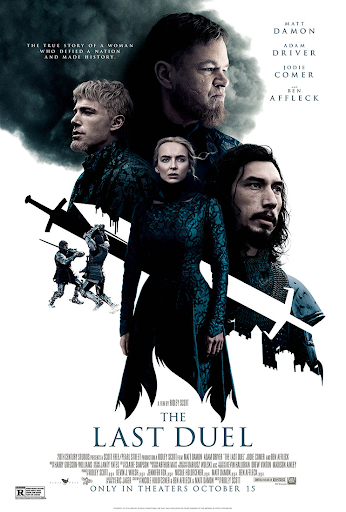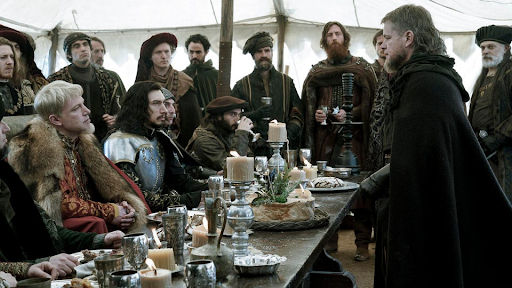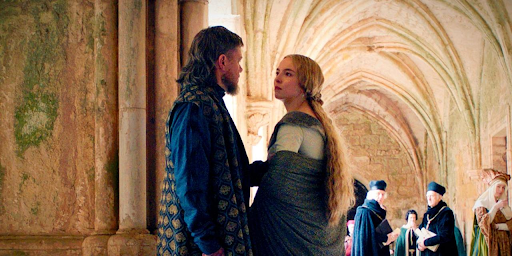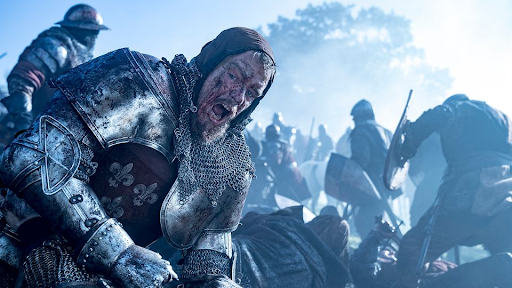by Mason Leaver
The Last Duel (2021) by Ridley Scott is a complicated work to review. It is a film with incredible spectacle and action, beautiful cinematography, gripping performances, and a compelling narrative. At the same time, the story deals with a subject matter that is so horrific, it’s hard to analyze any part of the film save for it’s handling of this event. In his latest film, Ridley Scott rides a fine line between creating an epic and sensationalizing assault, between denouncing brutality and highlighting it, between criticizing medieval values and oversimplifying modern values. Nevertheless, he has succeeded in threading the needle, though not without the occasional misstep.
The Last Duel focuses on the story of the historical duel between the French knight Jean de Carrouges (Matt Damon) and squire Jacques Le Gris (Adam Driver). After Carrouges’s wife, Marguerite (Jodie Comer) accuses Le Gris of violently raping her, Carrouges challenges the squire to a judicial duel, to “allow God to decide” who is lying and who is telling the truth. Carrouges and Le Gris were once friends, but the film shows how the two slowly fall apart over the years. This takes up the majority of the runtime, and plays out as a complicated medieval court soap opera. The characters and their relationships are complex, and the politics of medieval France are played out carefully and dramatically.
One of the most outstanding aspects of The Last Duel is the incredible scale of the film. Ridley Scott frequently features massive set pieces that depict a Medieval France that feels lived in and real. Likewise, the war scenes and battles feel epic in scale. The film cost around 100 million dollars to make, and this huge budget makes the film feel as grand in scale as some of the Biblical epics of the 1950’s. Likewise, the final duel of the film feels extremely gritty and personal. The scene is dynamic - the positions of the two duelists shift and change throughout the fight, offering a tense and dramatic conclusion. It feels like Ridley Scott brought much of what he learned from making Gladiator (2000) into these scenes, though this film’s combat feels a bit weightier and more brutal than the combat of Gladiator.
As I stated previously, it feels like Ridley Scott is walking a fine line in this film. The scenes are gorgeously shot and feature huge set pieces and high drama. At the same time, the film is centered around some horrific events and depicts the horrible conditions that women lived in during the Medieval times. Scott simultaneously uses these events to critique the modern treatment of women, suggesting that many of the barbaric tendencies of the Medieval world have persisted to this day. Scott’s decision to show the assault not once, but twice, may seem to some viewers to be gratuitous. Indeed, I do wonder if this was necessary; it feels as if the film would have been just as powerful without showing us the scene from Le Gris’s perspective. Nevertheless, Scott broached a very difficult subject with a level of finesse and sophistication, even if I do not agree with every decision he made throughout, as I would have advocated for removing the assault scene from Le Gris’s chapter. Ultimately, it will be up to each viewer to form an opinion on what is in good taste and what is not.
The Last Duel is a film which features deep truths, challenging content, beautiful cinematography, excellent performances, and a compelling drama. It is a shame, then, that the film has done horrendously at the box office. The film has grossed just $23 million out of the initial $100 million budget. It is upsetting that more people are not seeing the film. If films like The Last Duel are going to be made in the future, audiences need to show their interest and appreciation by attending these films in the theater. A film like The Last Duel deserves to be seen on a big screen, in order to capture it’s grand scale. I cannot recall a film in recent memory which feels quite as large as Duel, and I fear that we may not see another for some time as a result of it’s financial failure. Regardless of its box office struggles, the film remains a deeply engrossing epic, worthy of seeing in a theater.





 RSS Feed
RSS Feed
